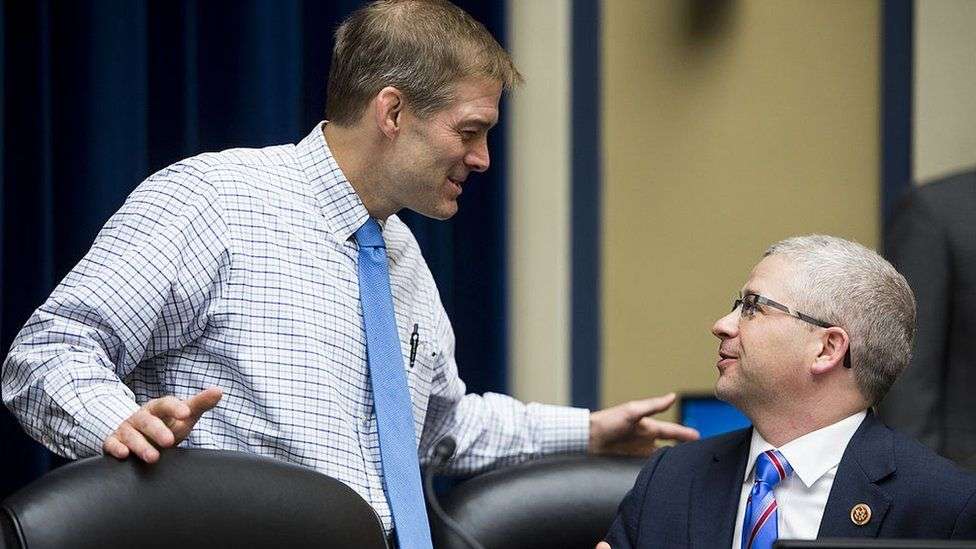A day after being chosen as the Republican party's nominee to be Speaker of the House of Representatives, Steve Scalise has withdrawn from the race. What happens now?
After beating right-wing hardliner Jim Jordan to get the backing of his party, Mr Scalise quickly saw support erode on Thursday.
Despite a day of cajoling on Capitol Hill, he was still short of the majority needed in the full House, telling reporters that it "wasn't going to happen".
His withdrawal, and the lack of a clear successor as nominee, means the vacuum at the very top of the US government persists.
It is 10 days now since the Speaker's chair was vacated, preventing the lower chamber of Congress from doing its most basic functions.
The roadblocks for Scalise
His Speaker bid was plagued by the same issues that vexed former Speaker Kevin McCarthy before he was overthrown last week.
The Republicans control the House but with a narrow majority.
To successfully secure the votes needed to win a floor vote, Mr Scalise needed 217 of 221 Republican representatives (House members) to vote for him. Only five rebels were needed to torpedo his leadership ambitions.
Despite his victory on Wednesday, momentum quickly swung against him.
The holdouts gave a variety of reasons, ranging from disagreements over policy to a simple desire to not uphold what some termed "the status quo".
The exit routes
1. Another Republican gets 217 votes
In the immediate aftermath of Mr Scalise's withdrawal, some lawmakers and Capitol Hill observers suggested that a path may open for Mr Jordan to become the new nominee.
Whether Mr Jordan can gain enough votes, however, is unclear. In the secret ballot that saw Mr Scalise become the nominee, Mr Jordan earned 99 votes to Mr Scalise's 113.
At the time, some Representatives expressed a reluctance to vote for Mr Jordan, a conservative hardliner backed by former President Donald Trump.
Other names are likely to be floated in the coming days. In the meantime, some Representatives have said they are at a loss.
"I have no earthly idea," Missouri's Mark Alford told NBC.
"We're a ship that doesn't have a rudder right now. And I'm thoroughly disappointed in the process. And I just pray to God that we find something".
2. A temporary speaker
Another proposal would see the House's acting Speaker, Patrick McHenry, be given additional powers for a temporary period.
This would allow the House to function - and avoid a government shutdown in a month's time - while a longer-term solution is found. This would require some cooperation from Democrats to work out the details.
"It's important that we get back to the business of running this country," Ohio Representative James Joyce said of that option, according to the Washington Post.
But some lawmakers don't want a short-term fix.
"Members want this resolved," Florida's Byron Donalds told reporters. "I think a... caretaker is not what members are interested in, and frankly I agree."
He said he believes a temporary speaker would not be effective amid ongoing negotiations over the budget and other issues.
3. Democrats to the rescue
A third option would be for Republicans to agree with Democrats on a consensus Republican candidate.
This option, however, would mean concessions be made to the minority party. Democrats want to eliminate a new rule introduced in January that gives any member the power to bring a vote to the floor to overthrow the Speaker.
"We are ready, willing and able to find bipartisan common ground," Minority Leader Hakeem Jeffries said on Thursday. But that requires Republican partners, he added.
"It means partnering to re-open the house to get the business of the American people done. And changing the rules that were enacted in January that empower their most extreme members".
Some lawmakers, including Democrat Alexandria Ocasio-Cortes, have suggested that five Republicans could switch sides and vote for Mr Jeffries to become Speaker.
Whether this has enough support among rank-and-file Republicans remains to be seen, but it seems very unlikely.
The potential crash
A vacancy in one of the most important roles in US government comes at a bad time.
Without a Speaker, the chamber is unable to pass any bills or approve White House requests for emergency aid. That includes help for Israel amid its ongoing fight with Hamas.
A leaderless House also means that Congress is unable to pass any spending bills - even short-term measures - that would allow the government to avoid a potential government shutdown in mid-November.
On Thursday, several members of the House suggested a solution is unlikely until early next week.
What exactly that looks like remains an open question.








